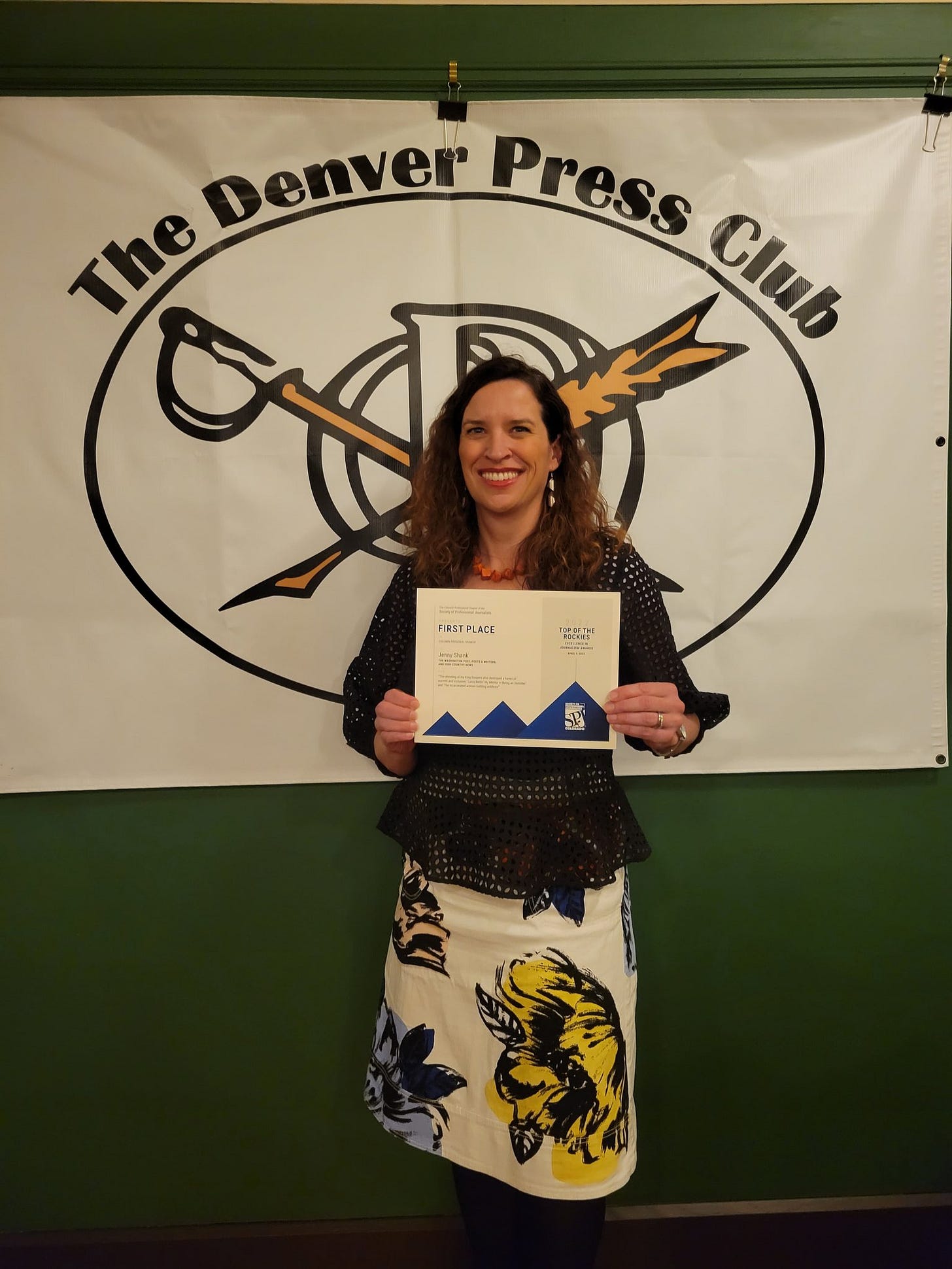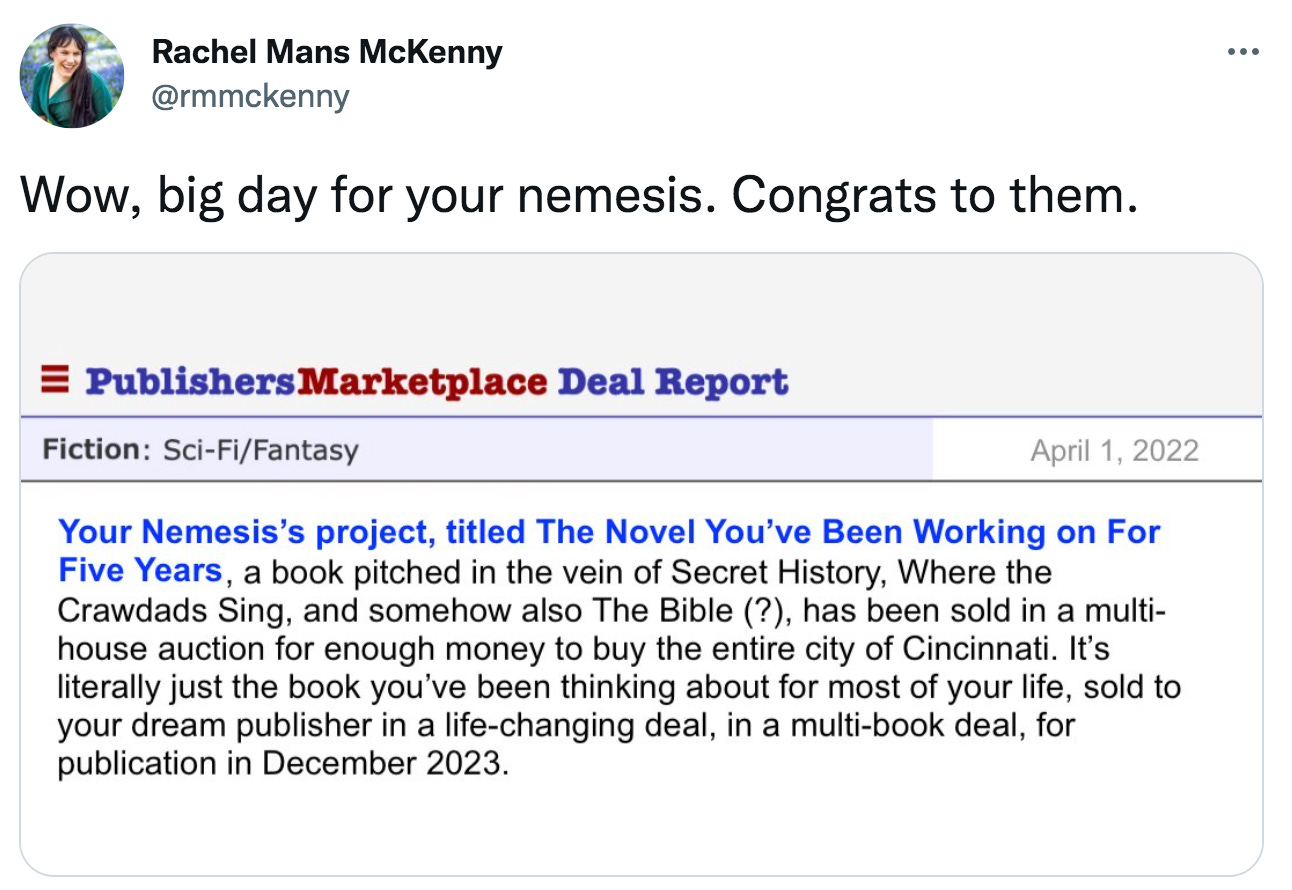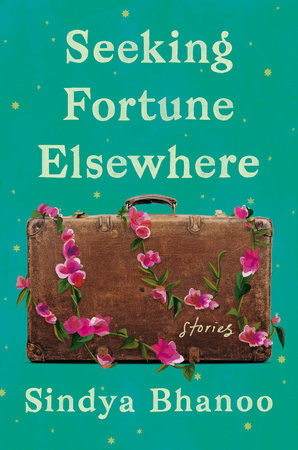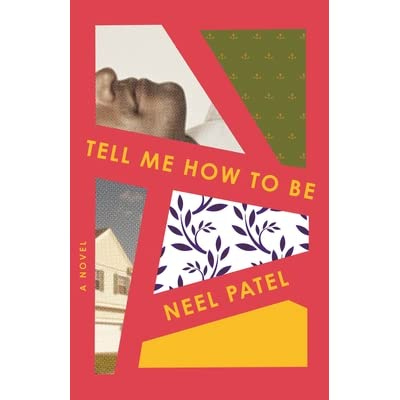Spring Sprang Sprung (my editors never let me write my own titles...can you tell why?)
A valiant teacher is rewarded, finding a mentor, new fiction about the immigrant experience, and a slew of new writing classes and events.
Last week I went to the Denver Press Club to attend the Society of Professional Journalists' Top of The Rockies Excellence in Journalism Awards. The Educator of the Year Award went to John Hopper, who has been teaching history in the little town of Granada, Colorado for the past 30 years. When he started out as a teacher in 1992, he was eager to begin an ongoing “living history” research project with his students. Amache, a World War II Japanese incarceration camp, sat just a little over a mile out of town, but at the time its history had all but been forgotten. Some town residents preferred it that way. But as Mike Littwin quotes Hopper in a Colorado Sun profile, “We don’t want anyone to forget,” Hopper said. “It’s important that we learn from our mistakes. That’s one of the reasons we teach history.”
Hopper got permission from the school’s administrators to begin involving students in the restoration and upkeep of the camp. They began seeking camp survivors and descendants of those survivors and interviewing them about their recollections. They collected artifacts, memories, and photographs. They founded the Amache Preservation Society. With a handful of students working year after year toward this goal, they were able to amass enough material to fill a museum. For decades, the site was completely staffed and maintained by volunteers, many of them John Hopper’s students.
Then, in February this year, congress approved Amache’s status as a National Historic Site, which means the National Park System will begin to oversee it and provide staffing and funding for its upkeep. This would have scarcely been possible without John Hopper’s tireless work to ensure that there was something left at Amache to preserve.
At the Denver Press Club, Hopper said that he’d been thinking of retiring in recent years, but he didn’t want to until there was someone he felt he could entrust the ongoing Amache project to. Then last year, one of his former students returned as a first-year teacher, and promised him that he would carry forward the project.
It’s a beautiful story that reminds me of how people working on valuable projects often have to toil in obscurity for a long time without any recognition or sense of payoff. Teachers teach, writers write, and historians document because the work is inherently good and valuable, to ourselves and to others.
And then every once in a while, your hard work is rewarded, the way it was for John Hopper with the designation of Amache as a National Historic Site and his shiny Educator of the Year plaque last week. I was also proud to win First Place in the Personal Column category in the medium newsroom division. There were 1507 entries from 75 newsrooms in Colorado, New Mexico, Utah, and Wyoming...plus a handful of entries from us freelancers. I haven’t been a full-time journalist since I had my kids, so it was good to feel like a real journalist for a night, and to learn about the good work that other people are doing in the world.
The Assorted Whimsy Portion of The Tumbleweed
There was a lot of good April Fool’s Day tomfoolery to choose from, but this parody of a Publishers Marketplace book deal announcement by novelist Rachel Mans McKenny was my favorite.
The Book Recommending Portion of The Tumbleweed
I recently reviewed two works of fiction for the Minneapolis Star Tribune about the experiences of South Asian immigrant families in America, Sindya Bhanoo's elegant, sensitive debut story collection Seeking Fortune Elsewhere, and Neel Patel’s Tell Me How to Be, a novel in which a mother and son hiding decades-old secrets struggle to harmonize.
I wrote, about Seeking Fortune Elsewhere:
“Yearning drives the characters in Sindya Bhanoo's elegant, sensitive debut collection "Seeking Fortune Elsewhere." The characters long for appreciation, absent loved ones, the customs of yesteryear, or the opportunity to exercise power. Bhanoo's stories feature several generations of characters from the Tamil community, living in the United States and Tamil Nadu, India, and traveling between…Often, there's no triumphant choice for these women, but Bhanoo shows how the act of choosing preserves their dignity.”
And I wrote about Tell Me How to Be:
“‘My mother always told me to be a good boy. I suspect she knew that I wasn't,’ Akash Amin explains as Neel Patel's novel "Tell Me How to Be" begins. This melancholy drama is structured as a first-person duet between narrators Renu and Akash Amin, a mother and son who have been singing past each other their whole lives. Fittingly, Renu and Akash don't address one another, but instead each speaks to a longed-for "you," a perpetual, beloved, missed connection, the particulars of which Patel gradually reveals…In this soulful, moody novel, Patel shows how Akash and Renu suffer from the impossibility of emotional honesty within their Indian immigrant community in the Midwest, its norms enforced by gossip and social snubs. There's an inherent forgiveness in the two-narrators tructure of this novel, recognizing that people who've made life difficult for others aret hemselves laboring under the burdens of their own thwarted hopes.”
The Q&A Portion of The Tumbleweed
Q: How do I find a writing mentor?
A: This question came to me through Twitter, shortly after I published my essay about my writing mentor, Lucia Berlin, in Poets & Writers Magazine (which was one of the three pieces that won that Society of Professional Journalists award).
The AWP Writer to Writer Mentorship is open for applications on Submittable through April 15, which is today! (Don’t worry—they offer it annually, so if you miss out, put it on your calendar for next year.)
You can also seek mentors through community writing programs and MFA programs. Not to toot the horn of the MFA I work at, but the Mile High MFA has a mentorship model, where students are working one-on-one with writing mentors for four semesters. I feel deeply invested in the writing of my students, especially thoose that I’ve helped shepherd through their thesis semester. Other low-residency programs probably have a similar mentorship setup. The Lighthouse Writers Workshop also offers a one-on-one mentoring program called The Book Project. Applications are due for that on June 25.
Jane Friedman, whose blog offers a wealth of publishing and writing information, compiled this list of mentorship programs writers can apply to.
Please send me any questions you’ve got about writing, editing, publishing, rabbit keeping, gardening, taco eating and naps. You can leave a comment or send me an email.
The Self-Promotional Portion of The Tumbleweed
The Rally Hotel in Denver and the Tattered Cover have selected Mixed Company for its Readers' Night In promotion. If you book a room, you'll get a copy of Mixed Company and a cocktail inspired by it called "Denver Sunshine."
On Tuesday, April 26, I’ll be talking with the great Patricia “MacArthur Genius” Limerick of CU’s Center of the American West about their Thompson Writing Awards and Mixed Company. The first 40 people to RSVP to events@centerwest.org will get a free copy of Mixed Company! The event will be held at Humanities 250 on the CU Boulder campus (6 pm) and via Zoom. Register for the Zoom version of the event here.
Hooray! Mixed Company is a finalist for the Colorado Book Award in the General Fiction category. On May 20, I'll be reading with the finalists for the General Fiction and Anthology categories for the 2022 Colorado Book Awards at BookBar in Denver, 7 p.m.
Lighthouse Writers Workshop’s annual Lit Fest classes are now open for registration! I'm teaching a bunch at Lighthouse HQ (3833 Steele St., Suite 1438, Denver, CO):
The Psychology of Story, Friday, June 10, 9:00am - 11:00am
Faculty Reading w/ Jenny Shank, Nick Arvin, Joy Sawyer, Harrison Fletcher, and Traci Jones, 7:30 p.m., free
Mixing Life Up: Contemporary Memoir Structures, Monday, June 13, 1:30pm - 3:30pm
Building the Writers' Notebook, Monday, June 13, 4:00pm - 6:00pm
Getting Published: Stories, Essays, Articles and Books, Wednesday, June 15, 4:00pm - 6:00pm
Laughing for Change: Funny Stories with Serious Purpose, Saturday, June 18, 1:30pm - 3:30pm
Personal Essays with a Twist, Saturday, June 18, 4:00pm - 6:00pm
Navigating the Lows of Your Writing Career: Panel Discussion, Sunday, June 19, 12:00pm - 1:00pm
I volunteered for the National Book Critics' Circle's John Leonard Award Committee, and I got to write the citation for our winner, Afterparties by Anthony Veasna So. I was quoted in the New York Times, which is the first time my name has appeared in the NYT.










